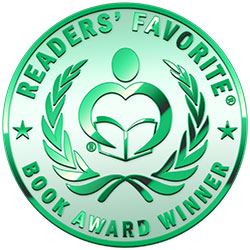
 This author participates in the Readers' Favorite Free Book Program, which is open to all readers and is completely free. The author will provide you with a free copy of their book in exchange for an honest review. You and the author will discuss what sites you will post your review to and what kind of copy of the book you would like to receive (eBook, PDF, Word, paperback, etc.). To begin, click the purple email icon to send this author a private email.
This author participates in the Readers' Favorite Free Book Program, which is open to all readers and is completely free. The author will provide you with a free copy of their book in exchange for an honest review. You and the author will discuss what sites you will post your review to and what kind of copy of the book you would like to receive (eBook, PDF, Word, paperback, etc.). To begin, click the purple email icon to send this author a private email.
![]() This author participates in the Readers' Favorite Book Review Exchange Program, which is open to all authors and is completely free. Simply put, you agree to provide an honest review an author's book in exchange for the author doing the same for you. What sites your reviews are posted on (B&N, Amazon, etc.) and whether you send digital (eBook, PDF, Word, etc.) or hard copies of your books to each other for review is up to you. To begin, click the purple email icon to send this author a private email, and be sure to describe your book or include a link to your Readers' Favorite review page or Amazon page.
This author participates in the Readers' Favorite Book Review Exchange Program, which is open to all authors and is completely free. Simply put, you agree to provide an honest review an author's book in exchange for the author doing the same for you. What sites your reviews are posted on (B&N, Amazon, etc.) and whether you send digital (eBook, PDF, Word, etc.) or hard copies of your books to each other for review is up to you. To begin, click the purple email icon to send this author a private email, and be sure to describe your book or include a link to your Readers' Favorite review page or Amazon page.
![]() This author participates in the Readers' Favorite Book Donation Program, which was created to help nonprofit and charitable organizations (schools, libraries, convalescent homes, soldier donation programs, etc.) by providing them with free books and to help authors garner more exposure for their work. This author is willing to donate free copies of their book in exchange for reviews (if circumstances allow) and the knowledge that their book is being read and enjoyed. To begin, click the purple email icon to send this author a private email. Be sure to tell the author who you are, what organization you are with, how many books you need, how they will be used, and the number of reviews, if any, you would be able to provide.
This author participates in the Readers' Favorite Book Donation Program, which was created to help nonprofit and charitable organizations (schools, libraries, convalescent homes, soldier donation programs, etc.) by providing them with free books and to help authors garner more exposure for their work. This author is willing to donate free copies of their book in exchange for reviews (if circumstances allow) and the knowledge that their book is being read and enjoyed. To begin, click the purple email icon to send this author a private email. Be sure to tell the author who you are, what organization you are with, how many books you need, how they will be used, and the number of reviews, if any, you would be able to provide.

Reviewed by Chris Fischer for Readers' Favorite
In a highly interesting and well done book in the category of cultural nonfiction, Why Do We Quote? The Near and Far of Others' Words and Voices by author Ruth Finnegan is a worthwhile read. Pulling from anthropology, cultural history, folklore, cultural studies, socio-linguistics, literary studies, and the ethnography of speaking, the book provides an absolutely fascinating look at why people in our society quote others and how we do it. The book also serves as an excellent study into ideas like imitation, allusion, authorship, originality and plagiarism, and will make readers think deeply into our framework for why we think the way we do about quoting and our use of quotations. This book is both entertaining and educational, and readers will enjoy it from start to finish.
I must admit, when I looked at Why Do We Quote? The Near and Far of Others' Words and Voices, my first thought was, "A whole book about quotations? How is that possible? And how could it be interesting?" But I was certainly surprised by author Ruth Finnegan's excellent work. Her work is amazing in that it presents form and usage of speech in a highly interesting fashion, and her style of historical inquiry into the topic almost makes one feel as if you are reading a whodunit mystery. I was drawn into this book from the very beginning, and enjoyed it so thoroughly that I read the whole thing in only a few sittings. I highly recommend Why Do We Quote? to any reader looking for a unique and interesting book with a wonderful historical perspective. I look forward to reading more from author Ruth Finnegan as soon as I can, and hope that she is hard at work on her next book!